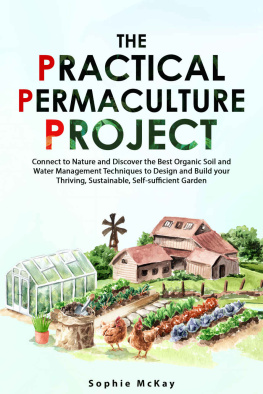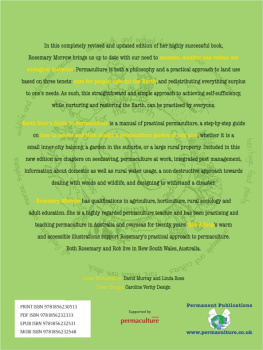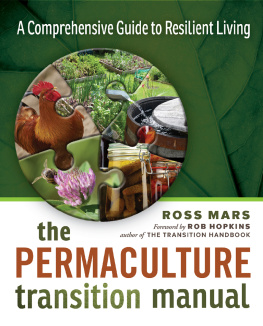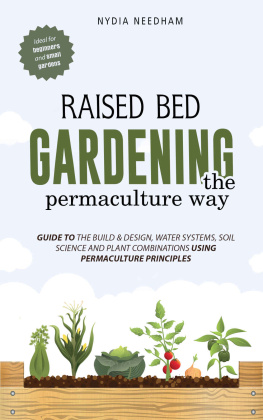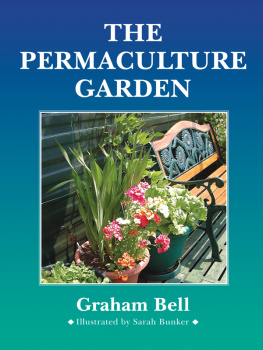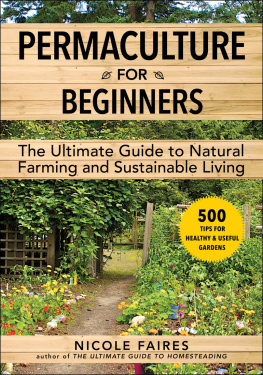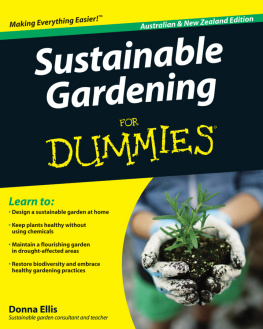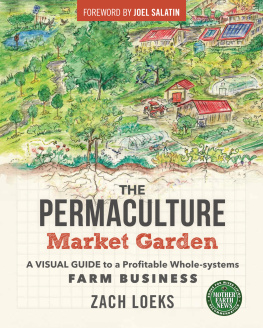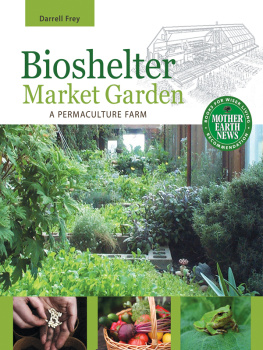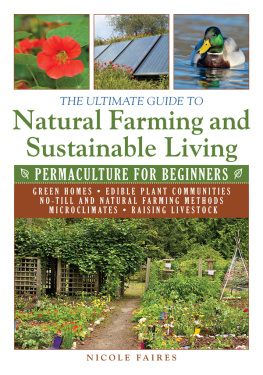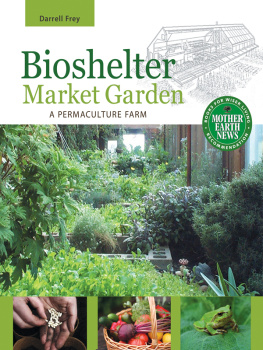The Practical
Permaculture Project
The Practical
Permaculture Project
Connect to Nature and Discover the Best Organic Soil and Water Management Techniques to Design and Build your Thriving, Sustainable, Self-sufficient Garden

Written by Sophie McKay
www.SophieMcKay.com
Copyright 2022 Sophie McKay
Published in the United States of America, 2022
Legal Notice: This book is copyright protected. This book is only for personal use. All rights reserved. No portion of this book may be reproduced, stored in a retrieval system, or transmitted in any form or by any means electronic, mechanical, photocopy, recording, or any other except for brief quotations in a book review, without the prior written permission of the author or publisher. For more information, contact www.sophiemckay.com
First edition, 2022
ISBN 978-1-7397356-0-9 (paperback)
ISBN 978-1-7397356-1-6 (ebook)
ISBN 978-1-7397356-2-3 (hardback)
Website: www.SophieMcKay.com
Email:
Author page: https://www.facebook.com/Sophie.McKay.Author
Facebook: www.facebook.com/groups/permaculture.garden.to.table.tribe
Table of contents

Before we begin, go and grab your FREE gifts!
Sophie McKays Seed starting & planting calculator
+ The Ultimate Guide to Organic Weed Management

In these free resources, you will discover:
- The perfect Seed Starting and Planting times for YOUR region or zone
- The 8 Organic Weed Removal Methods
- The 6 best and proven Weed Management Methods
- The tools you did NOT know you need for a weed-free garden
- How weeds can help your yard
- How to identify which weed is good and which is bad for a yard or garden
- The difference between Invasive and Noxious Weeds
Get your FREE copy today by visiting:
https://sophiemckay.com/free-resources/
Introduction

W
hen I was little, gardening seemed like the most natural thing in the world to me. I grew up on my grandparents farm, where a simple life was a happy one. My parents loved gardening so much they would take care in planting every seed or fruit tree we had around our yard. There were always flowers in our garden and fresh vegetables to eat, and soon enough, I had my first little herb garden of my own. It wasn't very big and didn't really last long, but growing up in that environment had such lasting effects on me, not least the love of cooking from fresh ingredientsthe pride when you know what goes into your meal instead of eating factory-made foods with no flavor at all! And now here we are years later, after many mistakesI'll never forget losing those zucchini plantsfollowed by lots of studies, experience, and successes.
During my studies and work, I traveled a lot and visited many countries. I realized the incredible damage that traditional agriculture causes our environment, and it drew me toward permaculture about ten years ago. I realized that permaculture is the way to grow food in harmony with nature using all available resources. It is the way to design and maintain food production systems that imitate nature and consequently thrive with nature's resilience, stability, and diversity. Permaculture integrates people and their land to provide them sustainably with food, shelter, energy, and other needs in the long term.
Permaculture asks us to turn to nature for inspiration and follow its relationships and patterns. Everything in an ecosystem is related, interdependent, and crucial for the health of the system.
Whenever I mention permaculture to someone who's never heard of it before, I always get to hear something along the lines of "That sounds like a lot of work" or "That sounds complicated; I could never do what you're doing." This makes me smile, because I had the same thoughts when I first started, and now I rarely ever go to the grocery store.
Your future sustainable garden in your own backyard allows you to take charge of your own food supply with minimal damage to the environment. While we will also touch on the social and cultural aspects of permaculture, the purpose of this book is to show you why permaculture can change the way you relate to nature as you grow food and develop independence from outside sources of food. It gives you such an empowering feeling when everything starts coming full circle and you are able to say: "I created this." I believe it's our responsibility as people with firsthand knowledge of the joys of gardening to pass this message along.
This book is filled with simple and easy-to-follow instructions to help you transform your backyard or any space available in your home into a flourishing vegetable or fruit garden to meet your food requirements. The joy that you get from harvesting your own fresh produce is incomparable, and it feels amazing discovering a way to work with nature to fulfill your family's needs.
You are about to read a detailed and practical guide for designing and developing your own permaculture garden, advice on how to deal with problems and issues you will encounter that might discourage you, and a simple, easy-to-understand plan of action for building your permaculture operation.
Regardless of the size of the plot of land you have to work with, your climate, your financial resources, and your gardening skill, following this book's straightforward advice will allow you to create the permaculture garden that will be the beginning of your future food independence.
The Practical Permaculture Project is a comprehensive guide to sustainable living that gives you more financial stability. The techniques you'll learn in this book help you gain confidence in your own abilities to keep your family well fed despite economic or environmental uncertainty. Like the father of permaculture, Bill Mollison, once said: "Though the problems of the world are increasingly complex, the solutions remain embarrassingly simple."
Whether youre an experienced gardener or an absolute beginner, you can build your own permaculture garden. My decade of experimenting with permaculture techniques has brought successes and mistakes that have taught me so much, and I want to share those lessons with you. With the practical tips in this book, you can get started today, and before you know it, youll have a productive ecological system on your own doorstep.
So get rid of your fears and get down to gardening. Grow food, and you'll feel better than ever. It's time to find your green thumb.
Chapter 1

Getting Down to the Roots
A
s an avid gardener and a nature lover, Ive so often sought refuge from my worries in the presence of my plants. Ever since I was young, I tried to find ways to surround myself with nature by taking long walks in the park or going hiking. As an adult, my house has always been filled with houseplants and I love spending time in the company of my little green friends. Despite the deep connection I shared with nature, it never occurred to me that I could turn my passion into a source of sustenance.

